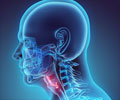What are the Causes of Wheezing?
Wheezing is commonly caused by conditions affecting the respiratory tract.
The causes of wheezing are as follows:
- Asthma: Asthma is one of the most common causes of wheezing. The muscles of the smaller airways called bronchioles undergo spasm and partially obstruct the flow of air during expiration, thus giving rise to expiratory wheezing. The patient also shows symptoms of shortness of breath, chest tightness and coughing. The attacks often occur at night and are triggered by sudden changes in weather, allergens like animal dander and pollen grains, exercise and respiratory infections. Hereditary factors also play a role in the development of asthma. Besides clinical symptoms, asthma is diagnosed based on pulmonary function tests, allergy tests and response to the medication, albuterol.
- Respiratory Tract Infections: Respiratory tract infections that could result in wheezing are:
- Viral infections: Viral infections especially those caused by respiratory syncetial virus (RSV) are associated with wheezing. RSV causes inflammation of the bronchi, which leads to wheezing especially in children. The children also show the presence of other signs of viral infection like runny nose and fever.
- Bacterial infections: Bacteria like mycoplasma, pneumococcus and hemophilus may result in infection of the bronchi, a condition referred to as bronchitis. Besides wheezing, the patient shows symptoms of fever with chills and cough with mucus production. Bronchitis is diagnosed based on physical examination and a chest x-ray. Infection of the lungs or pneumonia is also associated with wheezing. In addition, the patient suffers from fever with chills, persistent and worsening cough with mucus production, and fast labored breathing. Pneumonia is diagnosed on examination and using chest x-ray.
- Chronic Obstructive Pulmonary Disease (COPD): Long term exposure to cigarette smoke, noxious fumes, air pollution and dust causes irritation of the respiratory passages increasing the risk of COPD in the form of chronic bronchitis or emphysema. The patient experiences excessive mucus secretion, tightness of chest and wheezing.
- Heart Failure: Heart failure can cause wheezing due to accumulation of fluid in the lungs. Symptoms like shortness of breath, coughing and wheezing are similar to those seen in asthma. In addition, the patient may cough up pink or white frothy phlegm.
- Anaphylaxis: Anaphylaxis is a severe allergic reaction caused by insect bite like bee sting, or certain medications. It causes wheezing, along with other features like generalized swelling and a fall in blood pressure. It is a medical emergency and requires immediate treatment.
- Obstructive Sleep Apnea: Obstructive sleep apnea is a condition in which breathing temporarily stops during sleep. Children who have obstructive sleep apnea usually snore at night and are awakened by wheezing. Sleep apnea in infants is usually due to face and head anomalies, but in older children it is caused by enlargement of the tonsils and adenoids.
- Foreign Object Inhalation: Sudden onset of wheezing and choking indicates that a foreign object may have been inhaled. The object is removed with bronchoscopy.
- Tumors: Benign or malignant cancers of the respiratory system could obstruct the flow of air, resulting in wheezing. They may be diagnosed using imaging studies like CT scan.
- Gastroesophageal Reflux Disease (GERD): GERD is a condition where acid and food contents from the stomach regurgitate into the throat and sometimes into the airways. Symptoms of GERD in children include vomiting, coughing and wheezing.
- Epiglottitis: The epiglottis is a small flap that prevents food and drink from entering the lungs during swallowing. Inflammation of the epiglottis may be associated with wheezing.
- Medication: Medicines such as aspirin cause wheezing in children and adults.
- Congenital Causes: Congenital causes like laryngomalacia, tracheomalacia and anomalies of great vessels can cause wheezing in infants. The wheezing in these cases is position-related.
- Multiple Respiratory Illnesses: Conditions like cystic fibrosis or immunodeficiency syndrome could result in multiple respiratory illnesses in a child less than a year old, and are associated with wheezing. The child may show a failure to thrive in these conditions. These conditions are diagnosed with ciliary function testing and measurement of immunoglobulin levels, respectively.







